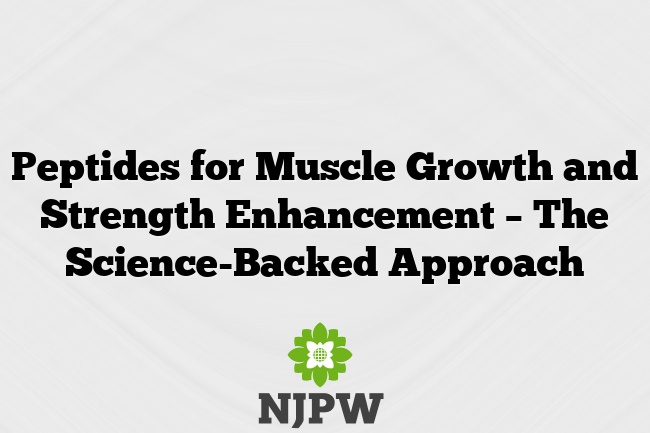Peptides for Muscle Growth and Strength Enhancement – The Science-Backed Approach

Athletes and fitness enthusiasts are constantly seeking new ways to enhance their muscle growth, strength, and overall performance. One class of compounds that has garnered significant attention in recent years is peptides. These small chains of amino acids possess the remarkable ability to trigger specific physiological responses, making them a promising tool for those seeking to maximize their physical potential.
| Peptide | Primary Function | Potential Benefits |
|---|---|---|
| IGF-1 | Stimulates muscle growth and repair | Increased muscle mass, improved recovery, enhanced strength |
| Follistatin | Inhibits myostatin, a muscle growth inhibitor | Greater muscle hypertrophy, enhanced muscle building |
| GHK-Cu | Promotes collagen synthesis and tissue repair | Improved joint health, accelerated muscle recovery |
What are Peptides?
Peptides are short chains of amino acids, the building blocks of proteins. Unlike larger protein molecules, peptides are smaller and more easily absorbed by the body, making them an attractive option for those seeking targeted physiological effects. Peptides can be naturally occurring or synthetically derived, and they play a crucial role in a wide range of biological processes, including muscle growth, fat metabolism, and hormone regulation.
The Role of Peptides in Muscle Growth and Strength
Peptides have a profound impact on muscle growth and strength enhancement. Certain peptides, such as insulin-like growth factor-1 (IGF-1) and follistatin, can directly stimulate muscle protein synthesis, leading to increased muscle mass and improved strength. IGF-1, for example, activates the mTOR pathway, which is a key regulator of muscle growth and repair. Follistatin, on the other hand, inhibits the action of myostatin, a protein that limits muscle growth. By suppressing myostatin, follistatin allows for greater muscle hypertrophy and enhanced strength development.
Key Peptide Compounds for Muscle Enhancement
While there are numerous peptides with potential applications in the realm of muscle growth and strength enhancement, a few stand out as particularly promising. Mechano Growth Factor (MGF) is a splice variant of IGF-1 that is specifically upregulated in response to mechanical stress, such as that experienced during resistance training. MGF helps to initiate the muscle repair and growth process, making it a valuable tool for athletes and bodybuilders. Sermorelin, a synthetic growth hormone-releasing hormone (GHRH) analog, can stimulate the body’s natural production of growth hormone, leading to increased muscle mass and improved recovery. Ipamorelin, another GHRH-based peptide, has been shown to enhance muscle protein synthesis and reduce body fat, making it a popular choice for those seeking a comprehensive approach to body composition optimization.
Optimizing Peptide Dosage and Timing
Achieving the desired results with peptides requires careful consideration of dosage and timing. The optimal dosage for each peptide can vary depending on factors such as an individual’s age, body weight, and goals. Generally, peptide dosages range from 100-500 micrograms (mcg) per day, with the specific amount tailored to the individual’s needs. Timing is also crucial, as the body’s response to peptides can be highly sensitive to when they are administered. For example, IGF-1 and Follistatin are often taken pre-workout to maximize their impact on muscle growth and repair during and after training.
Synergistic Effects with Other Supplements
Peptides can also be combined with other supplements to create a more comprehensive approach to muscle growth and strength enhancement. For instance, creatine and whey protein can work synergistically with peptides to support increased muscle mass and power output. Creatine helps to replenish adenosine triphosphate (ATP), the primary energy currency of the body, while whey protein provides the necessary amino acids for muscle protein synthesis. By stacking these supplements with peptides, athletes and bodybuilders can optimize their training and recovery, leading to more significant gains in muscle size and strength.
Minimizing Side Effects and Ensuring Safety
While peptides are generally well-tolerated, it’s essential to be aware of potential side effects and take steps to ensure their safe use. Some common side effects may include headaches, flushing, and gastrointestinal discomfort. To mitigate these risks, it’s crucial to source high-quality peptides from reputable suppliers, follow dosage guidelines, and monitor your body’s response closely. Regular blood work and communication with a healthcare provider can also help identify any potential issues and ensure the safe and responsible use of peptides.
Incorporating Peptides into a Fitness Regimen
Incorporating peptides into a comprehensive fitness regimen can be a powerful way to enhance muscle growth, strength, and overall performance. The key is to carefully research and select the appropriate peptides based on your individual goals and needs, and then integrate them seamlessly into your training, nutrition, and recovery plan. This may involve consulting with a knowledgeable healthcare provider or working with a coach who specializes in sports performance optimization.
The Science Behind Peptide-Induced Muscle Gains
The mechanisms by which peptides promote muscle growth and strength enhancement are well-documented in scientific literature. Peptides can influence various physiological pathways, such as protein synthesis, muscle repair, and hormone regulation, all of which are crucial for building and maintaining lean muscle mass. By understanding the underlying science, athletes and bodybuilders can make more informed decisions about how to incorporate peptides into their training and supplement regimens.
Monitoring Progress and Adjusting the Protocol
Tracking progress and making adjustments to your peptide protocol is essential for achieving optimal results. This may involve regularly monitoring your body composition, strength levels, and overall performance metrics. If you’re not seeing the desired results, it may be necessary to adjust the dosage, timing, or combination of peptides you’re using. Consulting with a healthcare provider or experienced coach can help you fine-tune your approach and ensure you’re getting the most out of your peptide supplementation.
Long-Term Benefits of Responsible Peptide Use
When used responsibly and under the guidance of a healthcare provider, peptides can offer long-term benefits for athletes and fitness enthusiasts. By supporting muscle growth, enhancing recovery, and promoting overall health, peptides can help individuals maintain their physical performance and well-being over time. However, it’s crucial to approach peptide use with caution, prioritize safety, and always consult with a qualified professional to ensure the best possible outcomes.
Conclusion
Peptides have emerged as a powerful tool for those seeking to enhance their muscle growth, strength, and overall physical performance. By understanding the science behind these compounds and how to incorporate them safely and effectively into a comprehensive fitness regimen, athletes and bodybuilders can unlock new levels of muscle development and athletic prowess. With the right approach and guidance, peptides can be a valuable addition to any fitness enthusiast’s arsenal.
What are the key benefits of using peptides for muscle growth and strength enhancement?
Peptides can offer several key benefits for muscle growth and strength enhancement, including:
– Increased muscle protein synthesis
– Enhanced muscle repair and recovery
– Improved body composition (increased lean muscle mass, reduced body fat)
– Boosted natural growth hormone production
– Optimized hormone regulation for better muscle building and strength development
Are there any potential side effects or risks associated with peptide use?
While peptides are generally well-tolerated, there are some potential side effects that users should be aware of, such as headaches, flushing, and gastrointestinal discomfort. To minimize these risks, it’s crucial to source high-quality peptides from reputable suppliers, follow dosage guidelines, and monitor your body’s response closely. Regular communication with a healthcare provider is also recommended to ensure the safe and responsible use of peptides.
How can I incorporate peptides into my fitness regimen effectively?
To effectively incorporate peptides into your fitness regimen, it’s important to research and select the appropriate peptides based on your individual goals and needs. Work closely with a knowledgeable healthcare provider or experienced coach to develop a tailored protocol that integrates peptides seamlessly with your training, nutrition, and recovery plan. Regularly monitor your progress and be prepared to make adjustments to your protocol as needed to ensure optimal results.






